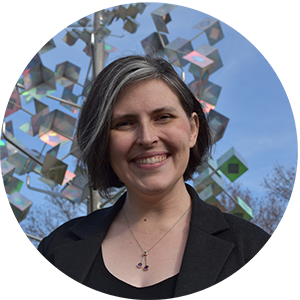
Dr. Rebecca F. Kemper
Chief Executive Officer of Columbus Landmarks
Q&A
Who have you admired in your path into the sciences and what qualities did you see in them that you embody in your own path?
In my career, I have admired — and worked with — many of my role models. My very first mentor in the sciences was Dr. Dan Keller; he was my middle school teacher that believed all youth can (and should) think scientifically. I also greatly respect and have had the privilege in collaborating with notable scientists who value the humanities in their pursuit of scientific understanding and knowledge sharing: Dr. Joe E. Heimlich (COSI/OSU) & the COSI CRE Team, Dr. Frederic Bertley (COSI), Dr. Alexander A. Petrov (OSU), Dr. Dennis Harper (retired, generation YES), Dr. La’Tonia Stiner-Jones (OSU), Dr. Bernadette Hanlon (OSU), Dr. David Delaine (OSU), Dr. Jennifer Evans-Cowley (UT Arlington), Rita Deedrick (Deedrick Consulting), Dr. Kyle Ezell (OSU), Phaedra Boinodiris (IBM), and Dr. Rachel Garshick Kleit (OSU).
Can you tell us about a memorable moment in your career—a time when you knew you were working in your purpose?
It was my first day working at the Center for Research and Evaluation (CRE) team at COSI Science Museum. COSI CRE is a team dedicated to advancing informal STEM education practice through international research and evaluation efforts. I was quite worried that it may take a long time for me to “fit in” and “contribute” on this team, given their prestigious academic contributions and my status as a mere PhD student, however within the first few hours on the floor they all came forward — each in their own way — to offer their support of my scholarship. They became my scientific family; one that I had been searching for that prioritized both practice and research in forwarding equitable, educational STEM opportunities for all. It was some of the most productive (and caring) years within the sciences I have ever experienced; I will never forget the warmth and care they showed me starting out that day.
What is one book or film you would recommend to a young person interested in a career in sciences?
A book that was very meaningful to me in terms of bridging the connection between the sciences with the humanities was Lakoff & Johnson’s Metaphors We Live By. It is too easy nowadays to become detached from the humanities when pursuing STEM careers. Innovation, discovery, and meaning-making that happens in STEM is often because of a robust understanding of our nature. Without this deeper understanding of ourselves, we risk repeating the inequities of the past.
Career Highlights
- Co-authoring the paper, “Reprioritising Workforce Development” with Phaedra Boinodiris in The Royal Society (RSA).
- Co-authoring the paper, “Technology Literacy as a Catalyst for Systemic Change,” with Dr. Dennis Harper in the Technological Horizons in Education (most read article for its publication month)
- Founding and serving as the first president of the Latino & Latina Engineering Graduate Student Association (LLEGA) at Ohio State University’s College of Engineering
- Awarded the International Education 2.0 Outstanding Leadership Award (2022) * Serving as a Contributing Editor to the Columbus & Dayton African American News Journal * Serving as co-editor of the Informal Learning Review
- Speaking on the NPR broadcasted, Columbus Metropolitan Club panel discussion, Chasing the Promise of Equitable Education, concerning equitable pathways into STEM careers
Biography
Dr. Rebecca F. Kemper is currently the Chief Executive Officer of Columbus Landmarks and first Hispanic leader for the organization. Formerly, she served as a researcher at the Center for Research and Evaluation at COSI and as a designer at the Gateway Film Center. Her research focuses on the intersection of technological advancement, the built environment, cultural meaning, and equitable STEM educational spaces. She attended The Ohio State University and holds degrees in Architecture (B.S.), Psychology (B.A.), and City and Regional Planning (MCRP, Ph.D.). Dr. Kemper’s work has been published in The Royal Society, Carolina Planning Journal, Technological Horizons in Education, The Routledge Handbook of International Planning Education, and the Journal of Urban Affairs.

